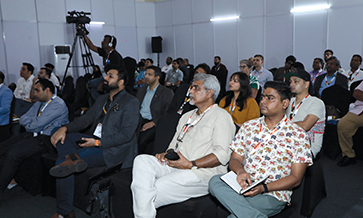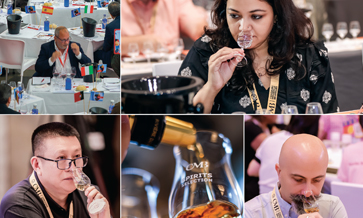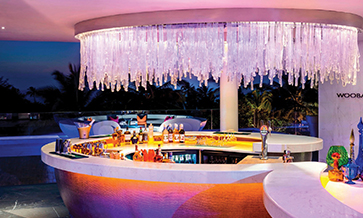There will come a time in India when we don’t look at bartenders through the lens of their gender, but see them as professionals doing their job. Bartending as a profession has seen a fast pace of change in India only in the last 5 years; so we should not judge the industry too harshly for not having a more significant percentage of women.
Several of the women we have profiled in this article are, in fact, trailblazers, opening up avenues where none existed before. We start our exploration by speaking to one of the youngest (women) bartenders in Delhi, Cindy Lalramnghaihzuali from Mizoram.
Cindy works at Hoots, a cocktail bar within a bar (Perch, in Vasant Vihar). Her journey started with being a part of the floor service team at Ek Bar, New Delhi. Back then, Ek Bar had Nitin Tewari and Suyash Pande, two of India’s finest bar stalwarts, guiding operations. Behind the bar was an excellent team, including Akhilesh Sheoran and Parambir Mudhar.
Supportive quarters
Watching them go about their job with confidence and passion was what got Cindy interested in bartending. A short-term bartending course helped her get her first break in a bar, and then a job at Perch, where she has now been for the past 3 years.
A supportive team and management there also pushed her to interact more with guests. For Cindy, it’s the family’s support that she feels is critical to help get more women to take up this line. Cindy loves her current job so much that she’s keen to open her bar down the line.
The year 2019 was the inaugural year for ‘30 Best Bars India’ and the organisers were shortlisting candidates for the Hospitality Legend of the Year. Shatbhi Basu was the one name that repeatedly came up for her pivotal role over 40 years in encouraging hundreds of people to join the bartending profession and, more importantly, to instil in them a love for their trade and craft.
An incurable optimist, Shatbhi prefers to see the glass half full. She feels there has been a sea change over the past 5 years. Women are nowadays more confident when it comes to persuading their families that the bar is the right place for them, she notes.
With travel and exposure, families have also changed and seen that the job of a bartender is an honourable one.
Back in the 1980s, when Shatbhi first began working in the bar, she says she got a lot of support from her colleagues, who never felt threatened by her presence. Over the years, she has worked in bars across the country, as well as in events big and small, and has never faced a problem.
Shatbhi agrees with Cindy on the crucial role of the family in supporting the decision; but also feels that a safe work environment is paramount – such as a drop back home in the wee hours of the morning.
The move to 24-hour operations in cities like Mumbai will, Shatbhi says, also lead to more women behind the bar, as bars can choose to give them shifts, which ensure they get off work at an early hour.
Winning accolades
Minakshi Singh, one of the few women bar owners in India, strongly feels that a safe work environment, including a drop back home at night, are critical to getting more women in the bar, and this is where 5-star hotels with their infrastructure and budgets can play a lead role towards encouraging more women.
“I would love to see 5-star chains launch an empowerment programme for women bartenders, rather than one more dining loyalty programme,” she stresses. Minakshi has stakes in Cocktails and Dreams Speakeasy in Gurugram and Sidecar in New Delhi.
Alisha (Ally) Castelino’s parents discouraged her from doing hotel management, so she did her B.Com instead. But she followed her passion by doing a year’s diploma course in hotel management at St. Andrew’s, which finally got her the Bombay Canteen job.
Her parents were initially not happy with her line of work, but their tune soon changed after Ally parlayed her skills behind and in front of the bar, by taking pole position in several prestigious bartending competitions in India.
Seeing her performances and the kind of feedback that she got on social media led to a change of heart on their part. After recently moving to Dubai after marriage, Ally was quick to get a job at Madinat Jumeirah’s Bahri Bar.
Her next target is to now get her in-laws to accept her role. A woman’s work is indeed never done!
Fair advantage
Having women behind the bar is an inherent advantage for the bar, feels Shatbhi. “For women, hospitality is a way of life. A bar also needs to be a welcoming space for a guest, with anyone approaching the bar and occupying a bar stool expecting some level of interaction and conversation. And this is where having a lady behind the bar can be a massive advantage,” she says.
Importantly, women also have a pretty good understanding of flavour, by virtue of their entering the kitchen at an early age!
Minakshi has been in the industry for over 18 years, working with top multi-nationals like Diageo and Pernod Ricard, and later with training firms like Tulleeho, before finally starting her bar with Yangdup Lama 8 years ago.
She would have expected more women than there at the moment. The growth is slow, she says, adding that the women present are more often than not outliers, or maybe there to tick a box.
The onus is also on the bar managers, whose positivity can help more women flourish under their wings. Sadly, she notes, it is considered more respectable for women to work on the floor, rather than behind the bar.
Feruzan Billimoria is a brand ambassador for new-age Indian gin brand, Stranger&Sons, for Mumbai and Pune. She was fortunate enough to come from a family that appreciates good food and liquor. Combined with her interest in flavours since childhood ensured that no eyebrows were raised when she decided to pursue a career in the bar and beverage industry.
Brand ambassadors
Stranger&Sons as a brand actively encourages and celebrates women in the industry. Charnelle is their Master Distiller in Goa and, along with Feruzan, they also have Saimai in Thailand and Celia in London as brand ambassadors.
“For the past 2 years, I have been leading this project to develop a platform for women in this field by celebrating the inspiring bartenders, entrepreneurs and women in the hospitality industry,” Feruzan adds.
Charnelle has spent the past 2 years diving deep into Indian history, agriculture, the history of gin, and extensive research on various botanicals and unique ingredients, helping her create an immersive learning experience for new consumers as well as trade.
Arina Suchde is a menu consultant for bars, but with a difference: her focus is on sustainability. She has done food and drinks menus for the Pantry Café, Kala Ghoda (Mumbai), and The Farm in Chennai, before recently turning her hand to a sustainability-driven cocktail menu for Mumbai’s Woodside Inn.
Arina’s understanding of customer psychology prompted her to use repurposed ingredients in cocktails, which consumers are already familiar with. Her Wabbit Margarita uses cold-pressed carrot juice; and the leftover pulp is used to make a cracker that goes as an accompaniment.
Bell pepper seeds from the kitchen are infused into Tequila. The Wheyski Sour uses ricotta whey as an egg-white substitute; and a cordial made using orange peels that are then dehydrated into dust for garnish.
Some of the cocktails at Woodside Inn have moved from the special menu to the main menu, proof that sustainability can become the norm and not stay a fad. The drinks also do not require any sophisticated equipment to re-purpose ingredients, which makes it a scalable trend.
Gender games
Ami Shroff from Mumbai is one of the veterans of India’s bar scene. She started by earning pocket money in bartending gigs in 2003 to being part of the team at Enigma, JW Marriott’s nightclub. She moved on to become one of India’s rare flair bartenders, representing India on the global stage in bartending competitions.
“In India, both genders have been artificially kept apart for so long that they don’t know how to interact with each other,” says Ami. It is not the only reason for men hitting on women or cracking sexual jokes, but it does contribute.
With rampant sexism in all walks of public life, there are few women behind the bar. Rare are the outlets, such as the Bombay Canteen, where there the ratio between men and women is relatively equal and which has a positive attitude for women to flourish.
“If you want more women behind the bar, then you need more women in ownership and managerial positions, who have a chance to influence this,” Ami notes.
Another outlier is Vidhi Puri, founder of The Cocktail Story, who used to work in experiential marketing. Her moment of epiphany came in September 2018 when, sipping a cocktail, she thought about cocktails that needed their stories told. She quit her job immediately and set up an Instagram account with her first post in October that same year.
Vidhi is quick to acknowledge her debt to stalwarts of the Indian bartending scene who continue to be very supportive. Although social media wasn’t a skill of hers in the past, one of the recent projects that she is most proud of is hosting a masterclass for bartenders, called ‘Be the next influencer’, which was attended by 95 bartenders, some coming from as far afield as Jaipur.
Vidhi now works with liquor brands, especially to help support cocktail competitions. She says that young bartenders are looking for a digital spotlight, which Cocktail Story has helped provide. Her plans for the future may also involve a magazine for bartenders, as well as more initiatives to unite the community further.
Talent matters
Born a woman, Fay Barretto, however, identifies more like a man: “When you have both powers, nothing can stop you!” Fay is a consultant with specialisation doing pop-ups and bar takeovers, and has helped develop menus for Goa’s Woodburn’s whiskey, a drunch menu for Tataki, and created a special one for Coromandel Café in Pondicherry.
Fay’s journey was sparked by watching flair bartenders at work, with Woodside Inn (Mumbai) being the first stop in a career that has taken Fay across India. In between, there has been a lot of learning from Alex at Mahe, George at Spiffy Dapper, Ami (Shroff) and Elini (of Bar Chef, Toronto).
Identifying as an alternate person, Fay strongly feels that individuals should be recognised for their work, not for their sexuality. Talent should be encouraged and supported. Along with a bunch of kindred minds, Fay has set up a team called Mr Bartender.
Fay and friends have also started a bartending academy that teaches women and LGBTQ people from all walks of life. Down the line, Fay is looking forward to sharing bar space with Elini and move to another country in Asia.
Building brands
Karina Aggarwal runs the appropriately named Gigglewater (alcohol during Prohibition era in the US). She is a beverage consultant and educator; and her education in the fields of anthropology, psychology and literature had been research-based.
As she began coming across exciting facts, the idea of a blog gained traction, and that’s what got Gigglewater off the ground in 2012. She turned freelance, contributing to a string of publications, including GQ and Conde Nast Traveller.
She started getting invited to drinks industry events and then being asked to host them. Soon she started basic appreciation classes for consumers around wine, beer and spirits. “No one day resembled the other,” she recalls.
She was invited 7 years ago by the prestigious Concours Mondial de Bruxelles, an international wine competition, to be on their tasting jury. Last year was her first year as a judge at the Brussels Beer Challenge.
Her current assignment with Terai Gin involves helping develop the entire eco-system for this Indian craft gin brand. In the next 5 years Karina looks forward to building a team as well as to help scale homegrown brands. More power to her!













